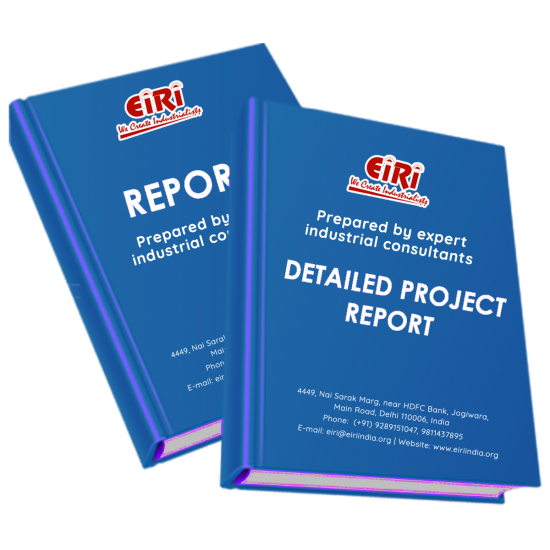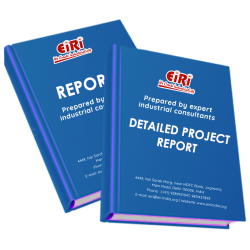Detailed Project Report on tissue culture

- More than 40 years of experience
- Managed by expert industrial consultants
- ISO 9001-2015 Certified
- Registered under MSME, UAM No: DL01E0012000
- 24/5 Research Support
Get your quesries resolved from an industry expert. Ask your queries before report or book purchase. - Custom Research Service
Speak to the our consultant to design an exclusive study to serve your research needs. - Quality Assurance
All reports are prepared by highly qualified consultants & verified by a panel of experts. - Information Security
Your personal & confidential information is safe & secure.
TISSUE CULTURE
[CODE NO.4111]
Tissue culture is the cultivation of plant cells, tissues, or organs on specially formulated nutrient media. Under the right conditions, an entire plant can be regenerated from a single cell. Plant tissue culture is a technique that has been around for more than 30 years. Tissue culture is seen as an important technology for developing countries for the production of disease-free, high quality planting material and the rapid production of many uniform plants. Micropropagation, which is a form of tissue culture, increases the amount of planting material to facilitate distribution and large-scale planting. In this way, thousands of copies of a plant can be produced in a short time. Micropropagated plants are observed to establish more quickly, grow more vigorously and taller, have a shorter and more uniform production cycle, and produce higher yields than conventional propagules.
Plant tissue culture is a straightforward technique and many developing countries have already mastered it. Its application only requires a sterile workplace, nursery, and green house, and trained manpower. Unfortunately, tissue culture is labor intensive, time consuming, and can be costly. Plants important to developing countries that have been grown in tissue culture are oil palm, plantain, pine, banana, date, eggplant, jojoba, pineapple, rubber tree, cassava, yam, sweet potato, and tomato. This application is the most commonly applied form of biotechnology in Africa.
COST ESTIMATION
Plant Capacity 8333 Nos/Day
Land & Building (8000 sq.mt.) Rs. 6.42 Cr
Plant & Machinery Rs. 1.59 Cr
Working Capital for 3 Months Rs.73.68 Lac
Total Capital Investment Rs. 9.02 Cr
Rate of Return 18%
Break Even Point 66%
- INTRODUCTION
- TYPES OF TISSUE CULTURE
- SEED CULTURE
- EMBRYO CULTURE
- CALLUS CULTURE
- CALLUS
- ORGAN CULTURE
- PLASMA CLOT METHOD
- RAFT METHOD
- AGAR GEL METHOD
- GRID METHOD
- PROTOPLAST CULTURE
- PROTOPLAST
- MARKET OVERVIEW OF TISSUE CULTURE
- METHOD OF PLANT TISSUE CULTURE
- INITIATION PHASE (STAGE 1)
- MULTIPLICATION PHASE (STAGE 2)
- ROOT FORMATION (STAGE 3)
- PLANT TISSUE CULTURE
- THE PROCESS OF PLANT TISSUE CULTURE
- TECHNIQUE FOR PLANT IN VITRO CULTURE
- MICROPROPAGATION
- SOMATIC CELL GENETICS
- TRANSGENIC PLANTS
- STEPS IN TISSUE CULTURE
- INITIATION PHASE
- MULTIPLICATION PHASE
- ROOT FORMATION
- SHOOT FORMATION
- ACCLIMATIZATION
- GENERAL PROCEDURE OF PLANT TISSUE CULTURE
- PREPARATION OF EXPLANT
- SURFACE STERILIZATION OF EXPLANT
- SEEDS
- FRUITS
- LEAVES
- PRODUCTION OF CALLUS FROM EXPLANTS
- PROLIFERATION OF CALLUS
- SUB CULTURING OF CALLUS
- SUSPENSION CULTURE
- DETAILS OF STOCK SOLUTION
- SOLUTION PREPARATION
- PREPARATION OF THE MURASHIGE & SK000 BASAL MEDIUM (MS)
- PREPARATION OF STOCK SOLUTIONS
- STOCK A: SALTS
- STOCK B: MGSO4
- STOCK C:
- STOCK D: VITAMINS
- MS BASAL SOLUTION*
- PREPARATION OF SOLUTION VGA
- PREPARATION OF VITAMIN SOLUTION
- PREPARATION OF HORMONE STOCK SOLUTION
- GIBBERELLIC ACID (GA3)
- NAPHTHALENEACETIC ACID (NAA)
- BENZYLAMINOPURINE (BAP]
- INDOLEACETIC ACID (IAA)
- KINETIN (KIN)
- 2, 4-D DICHLOROPHENOXYACETIC ACID
- PREPARATION OF ANTIBIOTICS
- SODIUM CEFOTAXIME (CLAFORAN)
- PREPARATION OF CALCIUM HYPOCHLORITE
- PREPARATION OF AN ACARICIDE SOLUTION
- PREPARATION OF SOLUTIONS FOR PH ADJUSTMENT
- SOLUTION TO BRING UP THE PH POTASSIUM HYDROXIDE.
- (KOH) I N
- USES
- DETAILS OF TISSUE CULTURE LABORATORY
- MICROPROPAGATION UNIT
- BASIC PROCESSES
- BASIC ORGANIZATION
- WASHING AND MEDIA PREPARATION AREA
- CULTURE AREA
- PRODUCTION PROCESS
- IN VITRO CULTURE ESTABLISHMENT STAGE
- PRODUCTION STAGE
- ASEPTIC CONDITIONS IN THE LABORATORY
- ASEPSIS IN THE FACILITIES
- ASEPSIS IN THE WASHING AND MEDIA PREPARATION ROOM
- ASEPSIS IN THE TRANSFERENCE ROOM
- ASEPSIS IN THE CULTURE ROOM
- PREBASIC SEED PRODUCTION PLAN
- TISSUE CULTURE OF BANANA
- COLLECTION OF SUCKERS
- DISINFECTION OF PROPAGULE
- INOCULATION
- MAINTENANCE OF SHOOT CULTURES
- PROLIFERATION OF SHOOTS (SUBCULTURE)
- ROOTING
- PREPARING TISSUE-CULTURED BANANA PLANTLETS FOR FIELD PLANTING
- GREEN HOUSE TECHNOLOGY
- TYPES OF GREEN HOUSES
- GREENHOUSE AREA
- LOCATING A GREENHOUSE ESTABLISHMENT
- TOPOGRAPHY
- DRAINAGE
- WATER SUPPLY
- SOLAR RADIANT ENERGY
- AIR POLLUTION
- SPACE FOR EXPANSION
- SOIL SUPPLY
- OPERATING COSTS
- MEDIA CONSTITUENTS FOR GREEN HOUSE
- PLANT MICRO-PROPAGATION
- INORGANIC NUTRIENTS
- ORGANIC NUTRIENTS
- NITROGENOUS SUBSTANCES
- CARBON SOURCE
- GROWTH HORMONES
- AUXINS
- CYTOKININS
- GIBBERELLINS
- AGAR
- PH
- INORGANIC SALTS
- AMINO ACIDS AND AMIDES
- WATER
- DESIGNS AND CLASSIFICATION OF GREENHOUSE
- CLASSIFICATION OF GREENHOUSE BASED ON SUITABILITY AND COST.
- A) LOW COST OR LOW-TECH GREENHOUSE
- B) MEDIUM-TECH GREENHOUSE
- C) HI-TECH GREENHOUSE
- OTHER CLASSIFICATIONS
- CLASSIFICATION AS PER TYPE OF STRUCTURE
- CLASSIFICATION AS PER GLAZING
- CLASSIFICATION BASED ON NUMBER OF SPANS
- CLASSIFICATION BASED ON ENVIRONMENTAL CONTROL
- POLY HOUSE
- A) NATURALLY VENTILATED POLYHOUSE
- B) ENVIRONMENTAL CONTROLLED POLYHOUSE
- SHADE HOUSE
- ORIENTATION OF GREENHOUSE/POLYHOUSE
- DESIGN
- A) DEAD LOAD
- B) LIVE LOAD
- C) WIND LOAD
- D) SNOW LOAD
- ORIENTATION
- WIND EFFECTS
- SIZE OF THE GREENHOUSE
- SPACING BETWEEN GREENHOUSES
- HEIGHT OF GREENHOUSE
- STRUCTURAL DESIGN
- DIFFERENT COMPONENTS OF GREENHOUSE
- CLADDING MATERIAL
- COMPARISON OF DIFFERENT KINDS OF COVERING MATERIALS.
- PLANT GROWING STRUCTURES / CONTAINERS IN GREENHOUSE PRODUCTION.
- ADVANTAGES OF CONTAINERS IN GREENHOUSE PRODUCTION
- ADVANTAGES AND DISADVANTAGES OF PLANT GROWING CONTAINERS.
- TABLES
- TABLE - 1
- TABLE - 2
- TABLE - 3
- WASHING-UP FACILITIES AND PREPARATION OF DISTILLED WATER
- PREPARATION OF CULTURE MEDIA FOR GREENHOUSE PLANT MICRO-PROPAGATION
- INCUBATION OF CULTURES
- STERILIZATION OF MATERIAL
- BASIC MINERAL NUTRIENTS
- SOLID MEDIA
- STATIONARY LIQUID MEDIA
- AGITATED LIQUID MEDIA
- CONTINUOUS IMMERSION
- PERIODIC IMMERSION
- MEDIA PREPARATION AND FUMIGATION METHOD FOR GREEN HOUSE PRODUCTION
- MEDIA PREPARATION FOR GREENHOUSE PRODUCTION
- GRAVEL CULTURE
- DESIRABLE NUTRIENT LEVEL IN GREENHOUSE GROWTH MEDIA
- MEDIA INGREDIENTS AND MIX
- PASTEURIZATION OF GREENHOUSE PLANT GROWING MEDIA
- FUNGICIDES AND THEIR EFFECT ON A FEW FUNGI
- TEMPERATURE NECESSARY TO KILL SOIL PESTS
- FUMIGATION IN GREENHOUSE
- REQUIREMENTS FOR GREEN HOUSE PLANT
- MICRO-PROPAGATION
- MEDIA ROOM
- CULTURE VESSELS
- CULTURE ROOM
- GLASSWARE AND PLASTICWARE WASHING.
- STERILIZATION
- (I) MEDIUM
- (II) GLASSWARE, PLASTIC AND INSTRUMENTS.
- (III) PLANT MATERIAL
- (IV) TRANSFER AREA
- ENVIRONMENTAL FACTORS INFLUENCING GREENHOUSE CULTIVATION.
- NATURAL VENTILATION
- UNCONVENTIONAL METHOD OF HEATING AND COOLING
- HEATING OF GREENHOUSE
- HEATING SYSTEMS
- BOILER
- UNIT HEATERS
- INFRA-RED HEATERS
- SOLAR HEATING
- ENVIRONMENTAL CONTROL
- TEMPERATURE CONTROL
- RELATIVE HUMIDITY CONTROL
- LIGHT INTENSITY CONTROL
- QUALITY OF LIGHT
- FAN AND PAD
- SELECTION OF FAN
- DESIGN
- MAINTENANCE OF PAD
- MAINTENANCE OF FAN
- CONSULTANTS FOR GREEN HOUSE
- SUPPLIERS OF PLANT & MACHINERIES
- BOILERS
- LABORATORY EQUIPMENT
- SUPPLIERS OF RAW MATERIALS
- SEEDS
- LABORATORY CHEMICALS
- SULPHURIC ACID
APPENDIX – A:
01. PLANT ECONOMICS
02. LAND & BUILDING
03. PLANT AND MACHINERY
04. OTHER FIXED ASSESTS
05. FIXED CAPITAL
06. RAW MATERIAL
07. SALARY AND WAGES
08. UTILITIES AND OVERHEADS
09. TOTAL WORKING CAPITAL
10. TOTAL CAPITAL INVESTMENT
11. COST OF PRODUCTION
12. TURN OVER/ANNUM
13. BREAK EVEN POINT
14. RESOURCES FOR FINANCE
15. INSTALMENT PAYABLE IN 5 YEARS
16. DEPRECIATION CHART FOR 5 YEARS
17. PROFIT ANALYSIS FOR 5 YEARS
18. PROJECTED BALANCE SHEET FOR (5 YEARS)
How to Make Project Report?
Detailed Project Report (DPR) includes Present Market Position and Expected Future Demand, Technology, Manufacturing Process, Investment Opportunity, Plant Economics and Project Financials. comprehensive analysis from industry covering detailed reporting and evaluates the position of the industry by providing insights to the SWOT analysis of the industry.
Each report include Plant Capacity, requirement of Land & Building, Plant & Machinery, Flow Sheet Diagram, Raw Materials detail with suppliers list, Total Capital Investment along with detailed calculation on Rate of Return, Break-Even Analysis and Profitability Analysis. The report also provides a birds eye view of the global industry with details on projected market size and then progresses to evaluate the industry in detail.
We can prepare detailed project report on any industry as per your requirement.
We can also modify the project capacity and project cost as per your requirement. If you are planning to start a business, contact us today.
Detailed Project Report (DPR) gives you access to decisive data such as:
- Market growth drivers
- Factors limiting market growth
- Current market trends
- Market structure
- Key highlights
Overview of key market forces propelling and restraining market growth:
- Up-to-date analyses of market trends and technological improvements
- Pin-point analyses of market competition dynamics to offer you a competitive edge major competitors
- An array of graphics, BEP analysis of major industry segments
- Detailed analyses of industry trends
- A well-defined technological growth with an impact-analysis
- A clear understanding of the competitive landscape and key product segments
Need Customized Project Report?
- Ask for FREE project related details with our consultant/industry expert.
- Share your specific research requirements for customized project report.
- Request for due diligence and consumer centric studies.
- Still haven't found what you're looking for? Speak to our Custom Research Team
About Engineers India Research Institute:
Our Approach
- Our research reports comprehensively cover Indian markets (can be modified as per your country), present investigation, standpoint and gauge for a time of five years*.
- The market conjectures are produced on the premise of optional research and are cross-accepted through associations with the business players
- We use dependable wellsprings of data and databases. What's more, data from such sources is handled by us and incorporated into the report
Why buy EIRI reports?
- Our project reports include detailed analysis that help to get industry Present Market Position and Expected Future Demand.
- Offer real analysis driving variables for the business and most recent business sector patterns in the business
- This report comprehends the present status of the business by clarifying a complete SWOT examination and investigation of the interest supply circumstance
- Report gives investigation and top to bottom money related correlation of real players/competitors
- The report gives gauges of key parameters which foresees the business execution






















